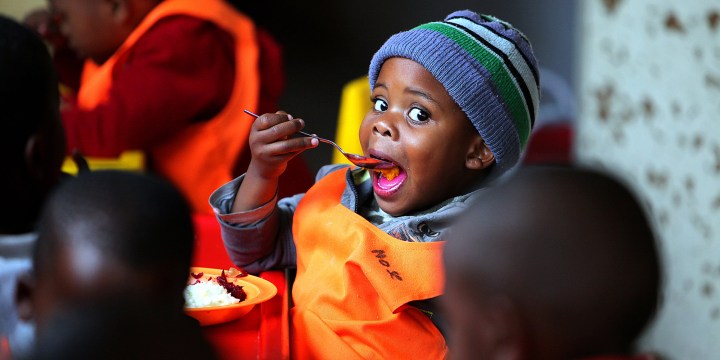OP-ED
No food, no learning: It’s time to stop stunting the potential of our youngest children

For many young children in impoverished communities, the daily meal they get at the ECD programme is often their only meal. Yet far more ECD programmes — especially those serving poor communities — are excluded from the subsidy because they are unable to meet the state’s registration requirements. The result is that fewer than 10% of young children are accessing the ECD subsidy.
About 30% of young children in South Africa live under the food poverty line (in households with a per capita income of less than R547 per month). This is not nearly sufficient to meet all the needs of developing children under six years, who require regular, nutritious meals to support their growth and development.
These early years are critical: they set the foundation for future health, education and economic development. Interventions are most effective during this period when brain activity and learning capacity are at peak levels.
Young children living in income-poor households often face multiple adversities; they are more likely to live in households without adequate water and sanitation and live far from healthcare services. Chronic malnutrition — which can result in stunting — is three times more common among children in the poorest households than those ranked in the richest 20%. Chronic malnutrition can have serious, lifelong consequences for young children: efforts to address income poverty and prevent chronic malnutrition must be stepped up and provided at scale.
Improving nutrition during the early years has several knock-on effects: it enables young children’s cognitive development, supports their physical growth and overall health and wellbeing, and in the long term, enhances their economic productivity in adulthood. These effects are stronger when nutrition interventions are combined with responsive caregiving — the presence of nurturing caregivers who create safe, protective environments for young children to grow and learn.
As a country, we have strong early childhood policies that are rights-driven and hold a vision of reaching all young children with essential services. The reality is a far cry from the policy-speak. While two-thirds (69%) of three- to five-year-olds attend an early learning programme, 70% of nought to two-year-olds are cared for at home. Home-based care is likely to be most suitable for under-threes, who need the constant care of an attentive, nurturing caregiver. However, government programmes are limited in their support for this vulnerable age group and their caregivers who will mostly access health services. Health and community-based programmes are therefore an important avenue to reach infants, toddlers and their caregivers with nutritional and stimulation support.
For older children, about 70% attend early childhood development (ECD) programmes that offer learning programmes and a protective environment while caregivers are occupied with work, studies or other daytime activities. Many ECD programmes have tapped into government’s funding and receive a state subsidy, which is intended to support children’s nutrition, among other things.
For many young children in impoverished communities, the daily meal they receive at the ECD programme is often their only meal. Yet far more ECD programmes — especially those serving poor communities — are excluded from the subsidy because they are unable to meet the state’s registration requirements. The result is that fewer than 10% of young children are accessing the ECD subsidy. This is in marked contrast with the National School Nutrition Programme that supports 77% of school-aged children.
Why are our youngest children a lesser priority? The barriers that prevent programmes in the most vulnerable communities from accessing the subsidy need to be urgently addressed. The Children’s Amendment Bill process provides a key opportunity to change legislation to enable expanded access to this essential safety net.
The Child Support Grant offers essential income support and reaches 81% of young children. But the grant amount of R450 is less than the food poverty line and has failed to reduce the high levels of stunting in children under-five. Importantly, the means test for the ECD subsidy is lower than the CSG means test — increasing inequities and creating further unintentional barriers to nutritional support. Alignment between these two social programmes will go a long way to simplifying systemic barriers and opening up pathways to nutritional support for children attending ECD programmes.
The closure of ECD programmes during the hard Covid-19 lockdown exacerbated the hunger crisis, forcing many young children and their families to queue for food relief. It is therefore critical to put children at the centre of our response plans to ensure that the nutritional needs of the youngest, most vulnerable children are prioritised and adequately addressed in humanitarian crises and disaster settings. This includes harnessing community health services and ECD programmes to identify children at risk of acute malnutrition and to become conduits of food relief.
Effective nutrition interventions with the right elements and delivered at the right time can reduce inequities and are a long-term investment in human capital — our young children cannot wait. The time to act is now. DM
Lizette Berry, Lori Lake and Camilla Thorogood are contributors to the South African Child Gauge 2020. This annual report on the status of South Africa’s children is published by the Children’s Institute, University of Cape Town in partnership with the DSI-NRF Centre of Excellence in Human Development, University of the Witwatersrand; Unicef South Africa; the Standard Bank Tutuwa Community Foundation and DG Murray Trust. #ChildGauge #ChildMalnutrition #SlowViolence #ZeroHunger















 Become an Insider
Become an Insider
Comments - Please login in order to comment.